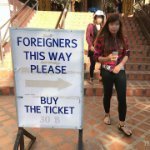"Working" without work permit - new regulation?
-
Recently Browsing 0 members
- No registered users viewing this page.
-
Topics
-
-
Popular Contributors
-
-
Latest posts...
-
141
Community American Tourist Assaulted by Bar Owner for Filming Venue
If the guy was just filming, then there wouldn’t be a heated argument. He would just stop when asked to do so. The video shows the filming started it, then the Mr RAF engaged in confrontation when asked to stop. One thing led to another and Mr RAF took one to the face. som nom na. -
31
UK Macron Blames Brexit for Channel Migrant Surge as UK-French Deal Faces Turmoil
If Britain wouldn't have been so stupid to leave EU they would get joined support to keep illegals outside. Self inflicted problem. Face it -
20
-
20
The Epstein List
I lived within that industry for a while. 'Big money' people involved. I mean billionaire class. Not unlike the Red Bull situation, people have made their payments and agreements. So nothing to see there. That's our world. Truth is a rare commodity. -
116
Trump promised 200 trade deals. He’s made 3
you should just stop before making a foul of yourself, ohhh but you already did, these are Australian territories thus part of Australia deal, where the heck did you come up with so much garbage , is it a maga thing not to acknowledge they are wrong you can say it, won't hurt and I promise not to make fun of it but just say you were trolling -
203
So where did you meet your Thai girlfriend or wife?
Well, your experience in finding a partner is ancient, and you were lucky, or your standards are low. Times have changed since then (19+ years ago). Everyone is advertising on dating apps and social media has taken over, yet you scoff at my list of attributes a potential partner must have, and don't believe I found a self-funded option that ticked my specific boxes. The list I gave was just the start of the requirements. What you think is complicated was actually quite a bit of fun. I didn't just ride into town - I've been here 20 years and tested out quite a few over that time.
-
-
Popular in The Pub






.thumb.jpeg.d2d19a66404642fd9ff62d6262fd153e.jpeg)





Recommended Posts
Create an account or sign in to comment
You need to be a member in order to leave a comment
Create an account
Sign up for a new account in our community. It's easy!
Register a new accountSign in
Already have an account? Sign in here.
Sign In Now